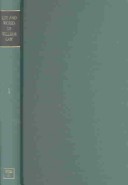Philosophy & Christian Thought in Britain, 1700-1900 S.
1 total work
William Law (1686-1761), controversialist, theologian and mystic, was (and is) considered one of the great intellectuals of his age. He took an anti-Lockean stance and came into confrontation with many of the leading theologians of his day. His works went through many editions, and he influenced, among others, Samuel Johnson, Edward Gibbon and John Wesley. His powerful and lucid writing style played a large part in this, the DNB describing it as "transparently clear, vivid, and pungent, ...his portraits remind us that he was contemporary of Addison, and a keener satirist". He is most famous for "A Serious Call to a Devout and Holy Life", which sided him with Berkeley and Joseph Butler, was partly responsible for slowing the spread of deism, and which continues to entrall evangelical Christians today. Indeed, his mysticism is perhaps more understood today than it was in his lifetime. Other famous works include his "Three letters to the Bishop of Bangor" and "Remarks upon a late book entitled, the Fable of the Bees". This edition of Law's works, first published in 1892-3, features all his writings plus a memoir by G.B. Morgan.
Added to these nine volumes is the first serious critical biography, Overton's "William Law, Nonjuror and Mystic". The 10-volume collection thus gives 18th-century scholars a complete archive for the study of this important man.
Added to these nine volumes is the first serious critical biography, Overton's "William Law, Nonjuror and Mystic". The 10-volume collection thus gives 18th-century scholars a complete archive for the study of this important man.
